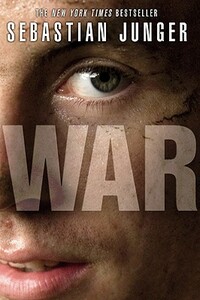Take a photo of a barcode or cover
Solid, harrowing account of random senseless battles in Afghanistan. Somewhat romanticized (everyone mentioned is a hero) but still felt realistic. Ugly ugly stuff.
Probably more of a 3.5 book, as I didn't really get much insight into either the soldiers or the war. And the tenses kept getting mixed up. But still worth reading.
Probably more of a 3.5 book, as I didn't really get much insight into either the soldiers or the war. And the tenses kept getting mixed up. But still worth reading.
reflective
tense
fast-paced
An interesting account of the war in Afganistan - particularly the remote outposts. I wanted to learn more about the soldiers lives though.
Each war generates its own collection of memoirs, novels and histories. Often, the best come after the conclusion of the war, thanks to the perspective of time. With combat in Afghanistan continuing, we probably have yet to see that war's canon. Among contemporary accounts, though, Sebastian Junger's War certainly is laudable,
As a correspondent for Vanity Fair, Junger took five trips to the Korengal Valley in eastern Afghanistan, where he embedded with a U.S. Army airborne unit. He spent most of this time with the most remote outposts, "the tip of the spear" of the U.S. military's effort in the valley. He is equally adept at describing the chaos and terror of actual combat as well as the often stupefying boredom that occurs between firefights.
Although the book tends to focus a bit more on one or two soldiers and even then doesn't really look at them and their experiences in great depth, the focus is on the soldiers, not policy or politics. That is what may elevate War above many other current works about combat in Afghanistan and Iraq. The soldiers themselves are not focused on a big picture or any grand strategy. Instead, they are concerned about the man next to them, a concern Junger uses to delve into the effects of combat on individuals and the role of war in human society.
At less than 300 pages, the book is too slim to fully explore the life of a combat soldier at a dangerous, remote outpost or thoroughly ruminate on the concept of its broad title. And recent events show how transitory military achievements -- and hence their stories -- can be. Just four weeks before Junger's book was released, U.S. forces withdrew from the Korengal Valley.
(Originally posted at A Progressive on the Prairie)
As a correspondent for Vanity Fair, Junger took five trips to the Korengal Valley in eastern Afghanistan, where he embedded with a U.S. Army airborne unit. He spent most of this time with the most remote outposts, "the tip of the spear" of the U.S. military's effort in the valley. He is equally adept at describing the chaos and terror of actual combat as well as the often stupefying boredom that occurs between firefights.
Although the book tends to focus a bit more on one or two soldiers and even then doesn't really look at them and their experiences in great depth, the focus is on the soldiers, not policy or politics. That is what may elevate War above many other current works about combat in Afghanistan and Iraq. The soldiers themselves are not focused on a big picture or any grand strategy. Instead, they are concerned about the man next to them, a concern Junger uses to delve into the effects of combat on individuals and the role of war in human society.
At less than 300 pages, the book is too slim to fully explore the life of a combat soldier at a dangerous, remote outpost or thoroughly ruminate on the concept of its broad title. And recent events show how transitory military achievements -- and hence their stories -- can be. Just four weeks before Junger's book was released, U.S. forces withdrew from the Korengal Valley.
(Originally posted at A Progressive on the Prairie)
a wonderfully personal account of war as we all should remember - not framed in the politics or world economy, but through the eyes of those fighting it.
adventurous
informative
inspiring
reflective
tense
medium-paced
dark
informative
slow-paced
Junger is a very good storyteller but to me his greatest strength is the digressions he takes to supplement the story. As in “The Perfect Storm” and “A Death in Belmont” he briefly cites medical, psychological and sociological studies along with authoritative background information to provide a richer reading experience.
Here’s a sample:
“We went over to the Afghan hooch and started with an AK. It was light and cheap-feeling, as if it were made out of tin, and Al said it has no internal recoil, so the entire force of the discharge goes straight into your shoulder. That makes it highly inaccurate after the first shot in a burst but mechanically so simple it requires virtually no maintenance. You could hide it under a rock and come back six months later and it would still shoot.
“The M4 fires a much smaller bullet, which means you can carry more ammunition for the same weight, but it’s not accurate over distance and tends to jam. Several times I’ve been in firefights where the man next to me was swearing and desperately trying to clear his weapon. The SAW was the smallest belt-fed weapon at Restrepo and had such a simple design that a monkey could have operated it. You pop open the feed-tray cover, lay the ammo belt into the receiver, snap the cover closed, and pull back the charging bolt; now you’re ready to fire 900 rounds a minute. The 240 is almost identical but larger and slower and the .50 is larger still, a barrel you could stick your thumb down and rounds the size of railroad spikes. With the .50 you could hit virtually anything in the valley you could see. During the Vietnam War, an American gunner supposedly attached a telescopic sight to his .50 and, with a single shot, knocked a messenger off a bicycle at two miles. It’s such a perfect weapon that the design has not changed in any meaningful way since World War I.”
The one and only warning I’d give about this book is that the details about the missions can get pretty confusing.
Here’s a sample:
“We went over to the Afghan hooch and started with an AK. It was light and cheap-feeling, as if it were made out of tin, and Al said it has no internal recoil, so the entire force of the discharge goes straight into your shoulder. That makes it highly inaccurate after the first shot in a burst but mechanically so simple it requires virtually no maintenance. You could hide it under a rock and come back six months later and it would still shoot.
“The M4 fires a much smaller bullet, which means you can carry more ammunition for the same weight, but it’s not accurate over distance and tends to jam. Several times I’ve been in firefights where the man next to me was swearing and desperately trying to clear his weapon. The SAW was the smallest belt-fed weapon at Restrepo and had such a simple design that a monkey could have operated it. You pop open the feed-tray cover, lay the ammo belt into the receiver, snap the cover closed, and pull back the charging bolt; now you’re ready to fire 900 rounds a minute. The 240 is almost identical but larger and slower and the .50 is larger still, a barrel you could stick your thumb down and rounds the size of railroad spikes. With the .50 you could hit virtually anything in the valley you could see. During the Vietnam War, an American gunner supposedly attached a telescopic sight to his .50 and, with a single shot, knocked a messenger off a bicycle at two miles. It’s such a perfect weapon that the design has not changed in any meaningful way since World War I.”
The one and only warning I’d give about this book is that the details about the missions can get pretty confusing.
Like a lot of Americans (I assume), I was pretty ignorant of what the war in Afghanistan really looked like for our soldiers. Junger's book offers a useful corrective to that ignorance by giving a portrait of a platoon of soldiers at the tip of the spear in the battle against the Taliban. Although I remain opposed to the US invasion of Afghanistan, I found myself greatly moved by this snapshot of young men at war and the bonds they form as a means of self-preservation.
War is my second book by Junger, and I found it to be even better than Tribe. He has a thoughtful, though also analytical approach to this subject and his style of writing is engaging, reading almost like fiction. If only it were fiction. War is an unflinching portrait of a reality human's have contended with and participated in almost since the dawn of civilization. He details his own experiences as a reporter, his relationship with the soldiers, their attitudes, fears, the trust and brotherhood between them and even small pleasures that make the precarious situations in which they find themselves bearable. Junger honors those who fight, as he follows them over the course of 15 months in Afghanistan. I found this to be a truly fascinating, moving read and not one I will be quick to forget. This is an author I will return to, I am sure of that.
Find more reviews and bookish fun at http://www.princessandpen.com
Find more reviews and bookish fun at http://www.princessandpen.com




